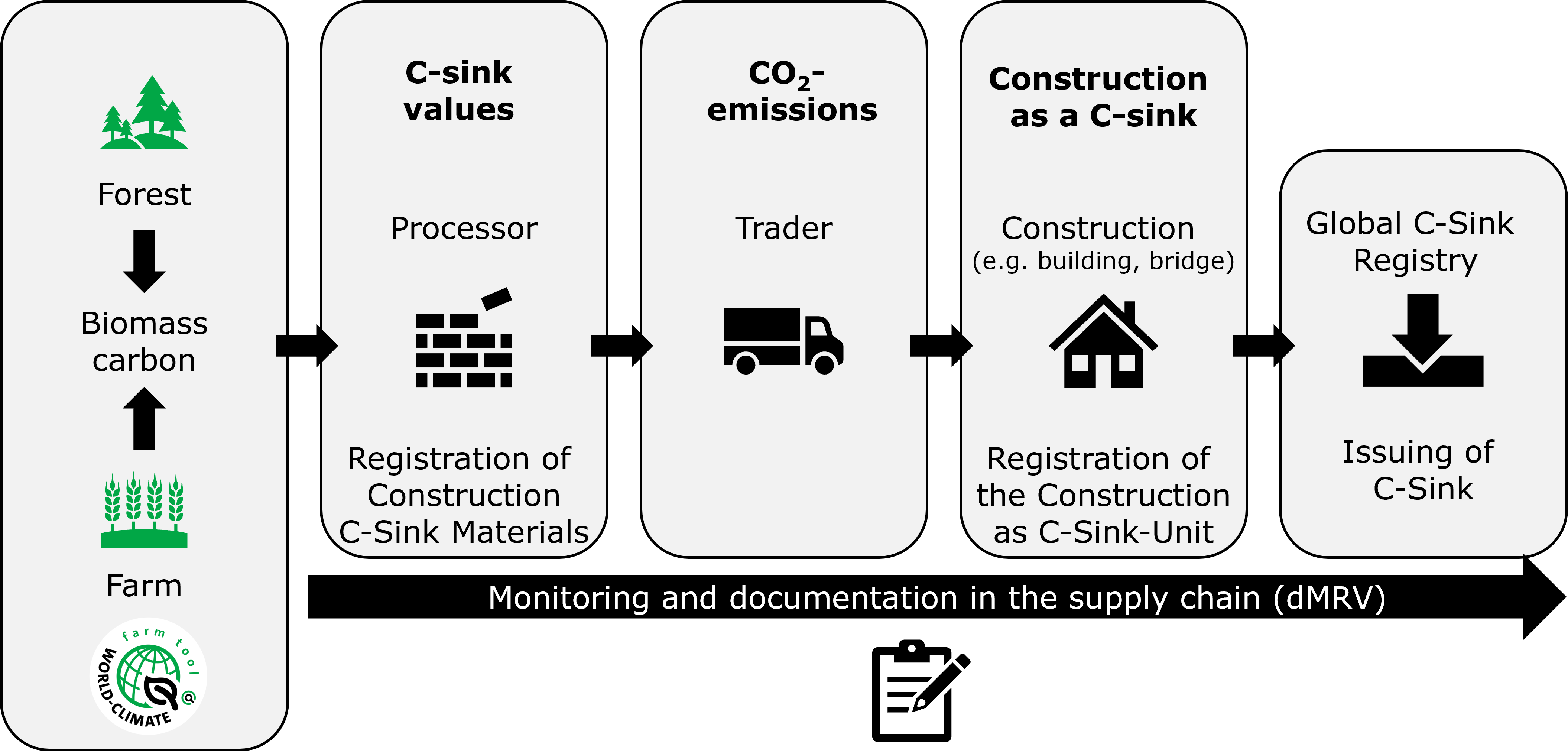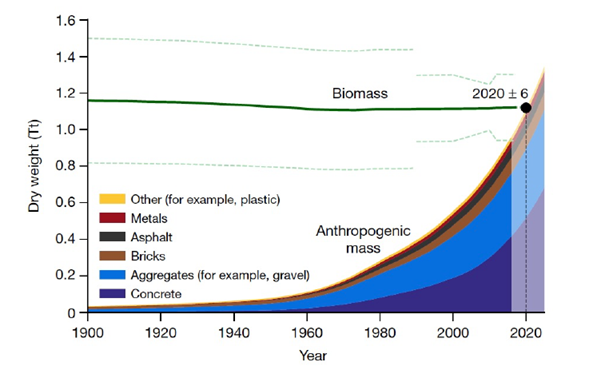
Global Construction C-Sink Standard
How buildings can store biogenic carbon long-term
The Global Construction C-Sink Standard verifies buildings and civil engineering works that contain biomass-derived Carbon Sink (C-Sink) Materials. The biomass contains biogenic carbon, which is based on the fact that CO₂ was previously actively removed from the atmosphere. This biomass, examples of which include hemp, straw, wood or biochar, is incorporated into the building and thus represents a carbon sink. Each verified construction is considered a C-Sink Unit and can be registered in our publicly available Global C-Sink Registry if all GHG emissions that were caused by the production and transportation of the embedded Construction C-Sink Materials were offset.
The Global Construction C-Sink Standard includes guidelines for rigorous tracking of biomass-derived carbon from biomass production to the construction site, accounting for greenhouse gas (GHG) emissions for all processing steps in the production of Construction C-Sink Materials (i.e., GHG expenditures) and registering the construction lifecycle. The present standard ensures that every unit of carbon sequestered within the construction materials is trackable through endorsed digital monitoring, reporting, and verification (dMRV) systems.
Why Global Construction C-Sink matter
- Immediate impact – Carbon is stored from day one.
- Scalable – Available in volumes sufficient for global markets.
- Traceable – Every C-sink is precisely located and verifiable within the building.
- Long term carbon storage – Storage is maintained over the lifetime of a construction, often beyond.

The first validated and verified building – by OPENLY
The Construction C-Sink Standard was developed in collaboration with Ithaka Institute for Carbon Strategies and Openly Systems and can be widely applied in the construction industry. All buildings that contain biomass-derived materials such as wood, hemp, straw, biochar and many others can be verified.
These valuable C-sinks are of the highest quality because they are secure, geo-localized and bound within the building for its entire lifetime.
The projects are implemented by our endorsed Construction C-Sink manager Openly Systems (contact).

Global Construction C-Sink, digital monitoring and documentation.



OPENLY received the Global Construction C-Sink Manager certificate. The first pilot project in Widnau, Switzerland shows what climate-friendly construction can look like today. Watch the video in our Blog. (2025)
If 20 % of the anthropogenic material could be replaced by biomass-derived materials and recycled carbon, around 400 gigatons of CO₂e could be removed from the atmosphere and transferred to carbon sinks over the next 20 years, which is roughly half of the negative emissions required to keep global warming below 1.5°C (UNFCCC, 2015), given that GHG emissions were curbed to 10 % by 2050 (Smith et al., 2024).

Biomass and anthropogenic mass estimates since the beginning of the twentieth century on a dry-mass basis following Elhacham et al., 2020.
Even if only a very feasible 10 % of the construction materials would be replaced by Construction C-Sink Materials, a very significant C-Sink increase of 200 Gt CO₂e could be achieved. For this reason, there is an urgent need for a validation and verification standard for construction-related carbon sinks (C-Sinks), which is provided for the first time in the novel Global Construction C-Sink Standard presented here.
Find a list of IT Tools applicable to the Global Construction C-Sink Standard here:
While fossil CO₂ emissions are significantly warming the Earth's atmosphere, reliable carbon sinks (C-sinks) are cooling the planet, leading to a global cooling effect. As long as we continue to generate fossil CO₂ emissions on this planet, C-sinks remain the only means to counteract this global warming. The Global Construction C-Sink Standard ensures that its global cooling effect is correctly calculated and publicly registered. The mandatory tracking system guarantees the integrity and transparent quantification of the C-sinks and their time-dependent climate effects.
Recycling construction materials is both an integral part of circular economies and crucial in determining the long-term fate of the carbon embodied in the C-Sink Materials. Thus, the possible recycling scenarios of construction materials are considered in the certification and registration procedures, ensuring that its global cooling potential is correctly calculated and publicly registered.
The validation and verification of a carbon sink includes all elements that have arisen during its construction. It thus not only includes the calculation of the global cooling effect of the carbon sink, but also the assessment and compensation of all emissions that have arisen during the construction of the carbon sink. The lifecycle of the construction must be estimated and compared to the average lifecycle of the same type of construction. Based on this assessment, the technical audit defines the monitoring method and controlling period of the Construction C-Sink.
A building usually represents a secure carbon sink for at least 60 years.
A Construction C-Sink is a building or work of infrastructure that contains a validated and verified amount of biomass-derived carbon that is protected from oxidation to CO₂ for verifiable periods of time due to its embedding in the construction. Every verified Construction C-Sink is considered a C-Sink Unit and can be registered.
Construction C-Sink Materials can be used in a construction project and contain significant quantities of carbon from non-fossil sources. The stored carbon remains in the material during its useful life. The approved materials are validated and registered in the Construction C-Sink Material Index.
If you would like to have Carbon Standards review potential modifications or amendments to the standard, please review the following:
Standard updates
Here you find the old version of the standards including a marked version with the changes to the current version of the Global Construction C-Sink Standard.

Contact person
 Robin Werren
Robin Werren
Product Manager Construction
+41 (0) 62 552 10 86
robin.werren@carbon-standards.com




